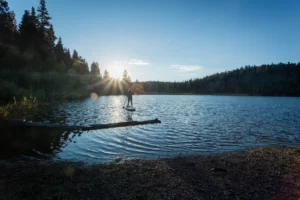
Psilocybin Assisted Therapy, Personal Use, and Evolve Wild Journeys: What’s the Difference?
Discover what a psilocybin retreat is, how it supports healing and mental health, and why Evolve Wild’s nature-based journeys offer a deeper transformation.
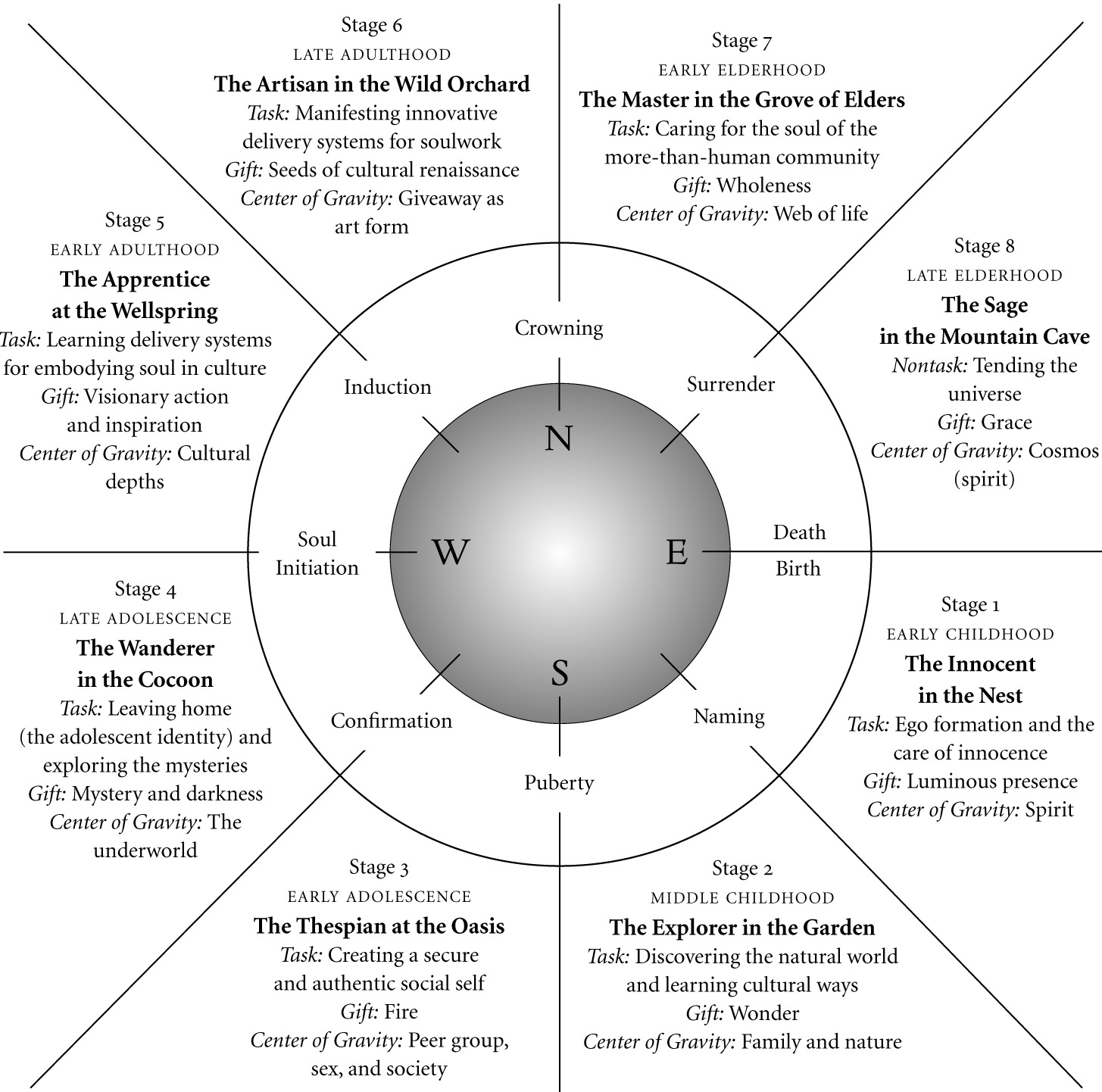
I was enrolled in a school psychology program. During my first semester, I took a developmental psychology course. They threw a bunch of models at us, including Erik Erikson with his stages of psychosocial development, Sigmund Freud and the psychosexual developmental stages, Maslow’s Hierarchy of Needs and the humanistic perspective, Skinner, Pavlov’s dogs and behaviorism, Bandura’s social learning theory, attachment theory, psychological development along different SES and races in America, and much more.
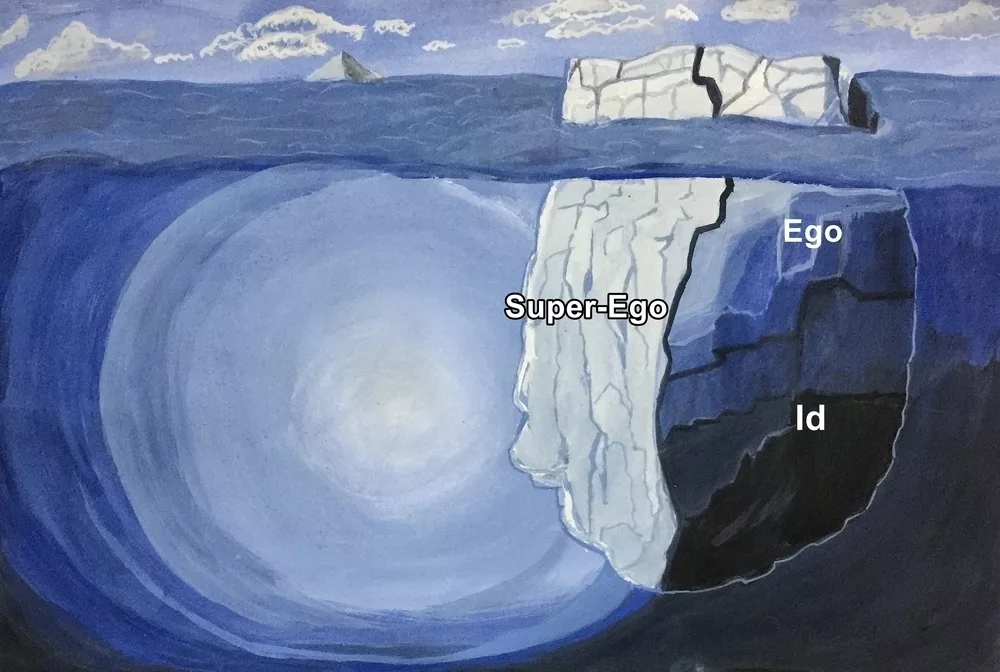
Each of these psychological theories recognizes aspects of our developmental processes and conscious make-up, and hopes to offer some tools to work with along those lines. But they don’t give us much insight into universal, lifelong human psychological growth, not to mention useful, practical steps to work with it in any tangible way, nor give much insight into improving well-being.
The one exception is Piaget’s theory of the stages of cognitive development. If you have children, you probably recognize the development milestones, like when your child should take their first steps, be toilet trained, etc.
Piaget’s theory helps us understand children’s cognitive development and the field of child psychology greatly. But it’s more a model of the different cognitive abilities according to age. That’s a different measure of development. Plus, the stages also end around the age 12, and it doesn’t give much insight into emotional development. Finally, it more reflects abilities as determined by biological and physical changes the child is going through.
The one that struck me the moment I first read about it was Bill Plotkin’s Developmental Wheel, with eight developmental stages, outlined in the book “Nature and the Human Soul.” But before diving into that, let’s look at what modern psychology offers in place of a model of development.
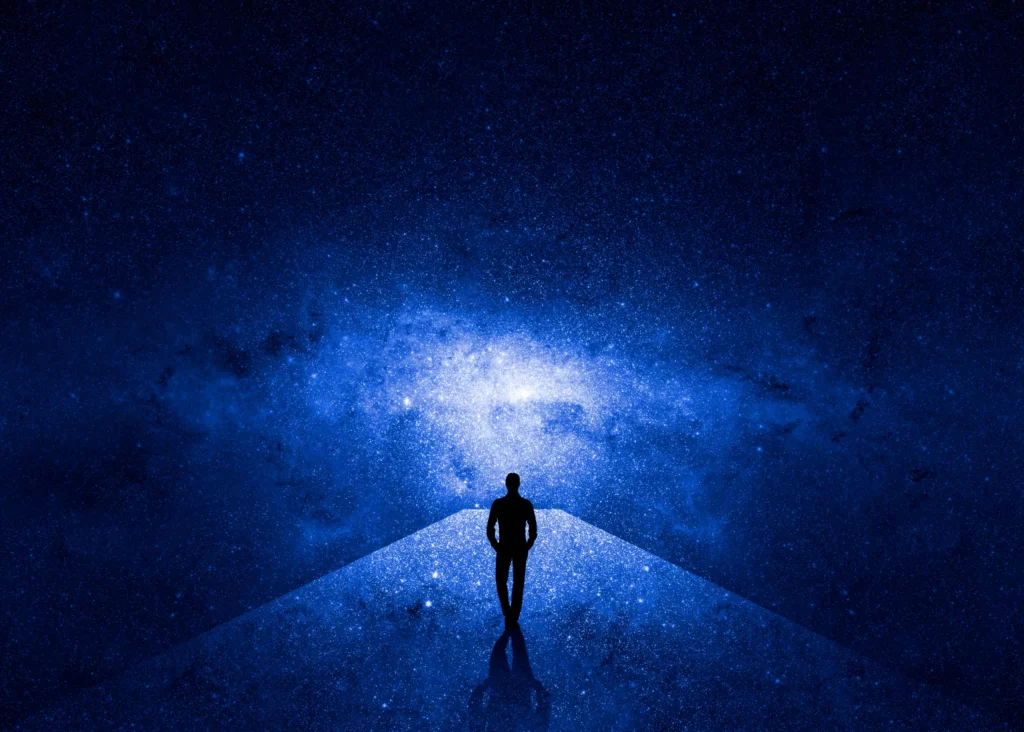
When you go to a mental health professional, they will diagnose your “mental illness” according to the Diagnostic and Statistical Manual (DSM – V, which is its 5th edition). They then try to fix these illnesses with different courses of therapy, or more commonly, pharmaceutical drugs.

The thing is, the ailments they treat are all essentially made up. They use their best estimation of “the norm”, or how normal people operate, as the standard they base their disorders off of. In other words, their basis for all of this is mainly just comparing you with how other “normal people” function given the framework of the larger culture.
People will spend their whole lives attempting to ignore and cover up parts of themselves in an effort to fit in to some mold of a normal human. Talk about creating self-doubt!
The goal of all of this is to try to best align you with the world as it stands. And, of course, to sell you drugs and other forms of treatment. It is, after all, a business. To me, that’s a terrible direction and an unsustainable approach to true mental health. The term “mental health” implies that it’s somehow independent of your physical health and the environment, which is not going to help us fix anything within or in terms of our presence in the world.
I think the aim of psychology should be to help us grow and mature into peaceful, wise, happy human beings who fully accept, love, and embrace themselves equally as they do the world around them.
This is, in my opinion, an emotionally healthy, mature human being. We have no standards for recognizing this, so we have developmentally stunted people in positions of power. It’s not as much them as it is all of us if we don’t understand what emotional development even looks like.
I think part of our limiting awareness is that we somehow try and fix ourselves amid a broken world, as though the internal and external don’t reflect each other. We judge ourselves according to the values perpetuated by this world, which comes down to financial success and power, regardless of how one achieves this success.
People want to contribute meaningfully to their culture and the larger world we all share. That’s built into our human nature. If everyone woke up tomorrow and decided that being a sustainable, peaceful and loving presence was priority number one, we could change everything overnight. It’s simply a matter of what we value most.
Getting to this awareness should be filled with joy, happiness, and love for one’s self and the world they surround themselves with. That’s pretty much the opposite of focusing on one’s issues and trying their best to make them go away in an attempt to have them fit in to an inherently unsustainable, unjust, and unhealthy society.
The Soul-centric Developmental Wheel speaks to all of that.
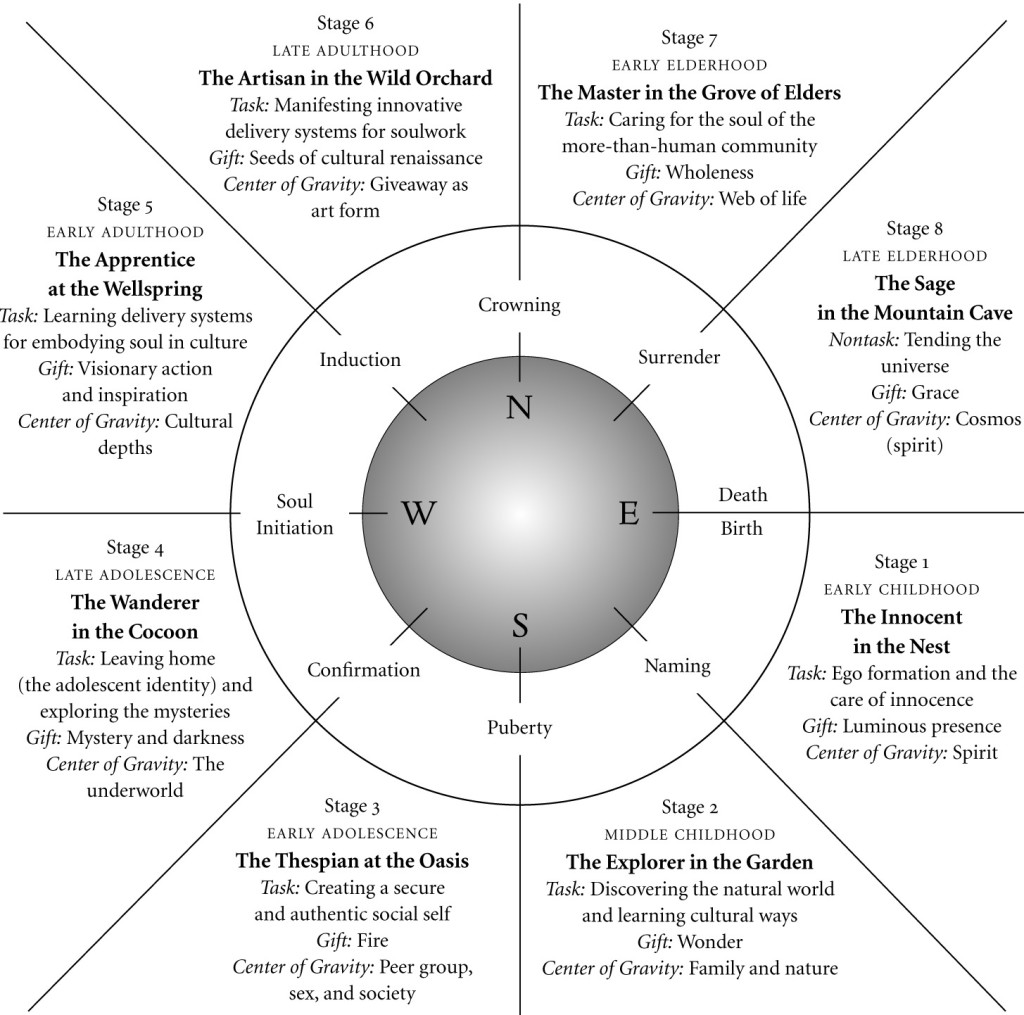
Dr. Bill Plotkin, founder of Animas Valley Institute, which has been guiding people on “Underworld Journeys” for over 3 decades now, created a model of human development out of his work. His theory outlines eight stages of psychological development in “Nature and the Human Soul: Cultivating Wholeness and Community in a Fragmented World”. It’s a detailed 500-page tome, with a whole other 300+ page book that expands on the passage from stage 3 through stage 4. I am going to attempt to boil this all down to a blog post. Obviously, I’ll leave out a lot.
The model outlines eight stages of ecocentric or soul-centric human development. Each of these stages had associated tasks for both culture and nature, as well as that stage’s “gift”. The person has to complete said tasks in order to move on to subsequent stages of development. And it views the life cycle as, well, cyclic.
I want to recognize that the first time I saw this I was in graduate school. I had my B.A. in psychology, had worked for years in residential programs, public schools, and even in wilderness therapy, but I had yet to find a model of human psychological development that resonated with me. I’ve talked with a lot of practitioners who, despite have an understanding of treatment plans, don’t consider psychological development stages in their approach. Most don’t realize this is even an issue. I didn’t either at the time.
Plotkin’s model not only made sense of psychological development, it also helped me see beyond cultural explanations of human development. And it spoke directly to the massive issues us people are creating. According to this theory, we were stuck in an immature stage of development. Now that’s something to work with!
But I didn’t accept it at first blush. I thought it was too simple just to get out into nature, too “hokey.” At the time, I even offered that as a critique during class. And I had spent tons of time outdoors since I was a child and sought it out for my own mental health throughout my life. This is even after I had lived in a tent for a summer, been a guide on several rivers, and had a life-altering awareness working in wilderness therapy.
In some ways, I still stand by that comment. Its presentation and verbosity are quite possibly why this is not yet a mainstream model. But it undoubtedly guides my understanding of the stages of human development and my work.
The underlying insight with this is that according to this model, people are, by and large, in an immature stage of psychological development. While we may continue to grow and learn through life, most people’s core values, morals, motivations, and deeper self-awareness, remain very similar past the third of eight stages people can reach. That’s a lot of underdevelopment!
When it comes down to it, society, and many businesses and institutions that drive culture, operate from a self-centered perspective. Most people operate from this perspective just to sustain themselves. But it’s causing both personal and cultural identity crises. We’re long overdue for our psychological maturity to catch up to our extended life spans, and we can become a mature, healthy, sustainable, even loving species.
The soul-centric, or eco-centric, developmental wheel views the stages of development as a cycle. It aligns with the course of a day or a year and, as I mentioned, divides into eight stages. Turns out everything natural is a cycle, so all that checks out with me.
Each stage has a nature-oriented task and a society-based one. We naturally gravitate towards both, but our people-centered world focuses primarily on the societal piece. This leaves our nature-based tasks underdeveloped. Without fulfilling this side of things as we age, our emotional and psychological growth gets stunted. At a certain point, we stop moving along it.
Again, the point of this post is to give you a quick introduction, underscore why it’s important, and how we can move forward. I’ll leave out a lot of the details. Feel free to leave questions and comments about it below.
Let’s begin:

Discover what a psilocybin retreat is, how it supports healing and mental health, and why Evolve Wild’s nature-based journeys offer a deeper transformation.
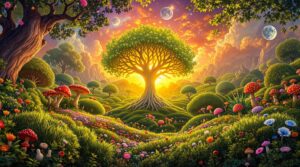
Discover what a psilocybin retreat is, how it supports healing and mental health, and why Evolve Wild’s nature-based journeys offer a deeper transformation.
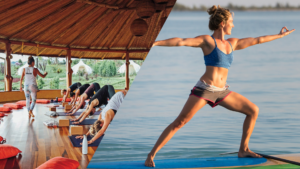
Whether you chose to spend your time on a Nature Based Journey or one of the many retreats, you should know the difference. Here are 5.

Through my journey in psychology and mental health, I realized what most people miss regarding mental health, despite it being so obvious!
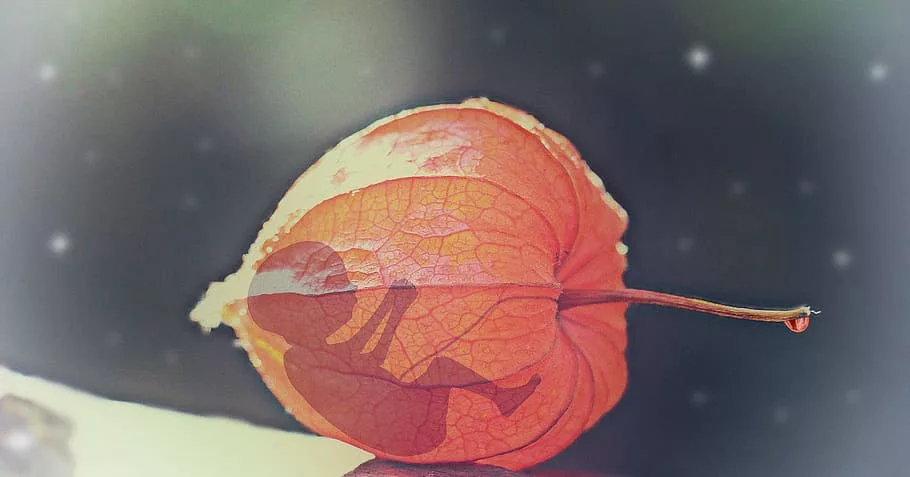
Life starts in the East, with birth. This is the break of day or early spring. Our first major transition is coming into this world from… who knows where, really. We enter the scene as a unique piece of consciousness in human form. The point of the first stage of life is to discover what it is to be human, to have this body, and live in this world.
Through this stage, we are still very much in contact with the eternal and with our purest form of self. We don’t really know anything else. While our ego is exploring how to get its needs met, the society-based task of this stage of life is largely up to our caretakers to make sure we are cared for so we can explore ourselves and this new world.
Very few people any memory of this period of our lives. We cross a gulf in consciousness naturally along our first major transition in consciousness, post-birth anyway. Around the age of 2 or 3, children develop naturally and move into the next stage.
One important thing to note: Other than keeping the child physically safe, nourished, cared for and loved, parents also have to protect the child’s innocence. More and more, parents are using this stage to program children’s very flexible minds for adulthood tasks and capabilities. This stage should be all about love and acceptance of the child as who they are (as difficult as that can be a two!) Allow the child to express themself rather than force your priorities on them.
All of this can also be said for adults working with their inner child. This all may be beyond most people’s access, so getting out into the natural world is important. It strips away all of what people build up in their lives and helps them explore who they really are when the experience of living life in alignment is all one has.
The effects of not allowing for presence will not show up until later in development or will show up in various other ways. But nearly all children develop ego integrity through the first stage automatically and move into the next stage of development at a certain age.
Kids are typically still very connected to their inner nature in this next stage, the world around them is an ever-unfolding mystery. They are building and strengthening their abilities while they learn family and cultural norms, knowledge, and ways of being. This is also an important time for them to begin building a relationship with the natural world.
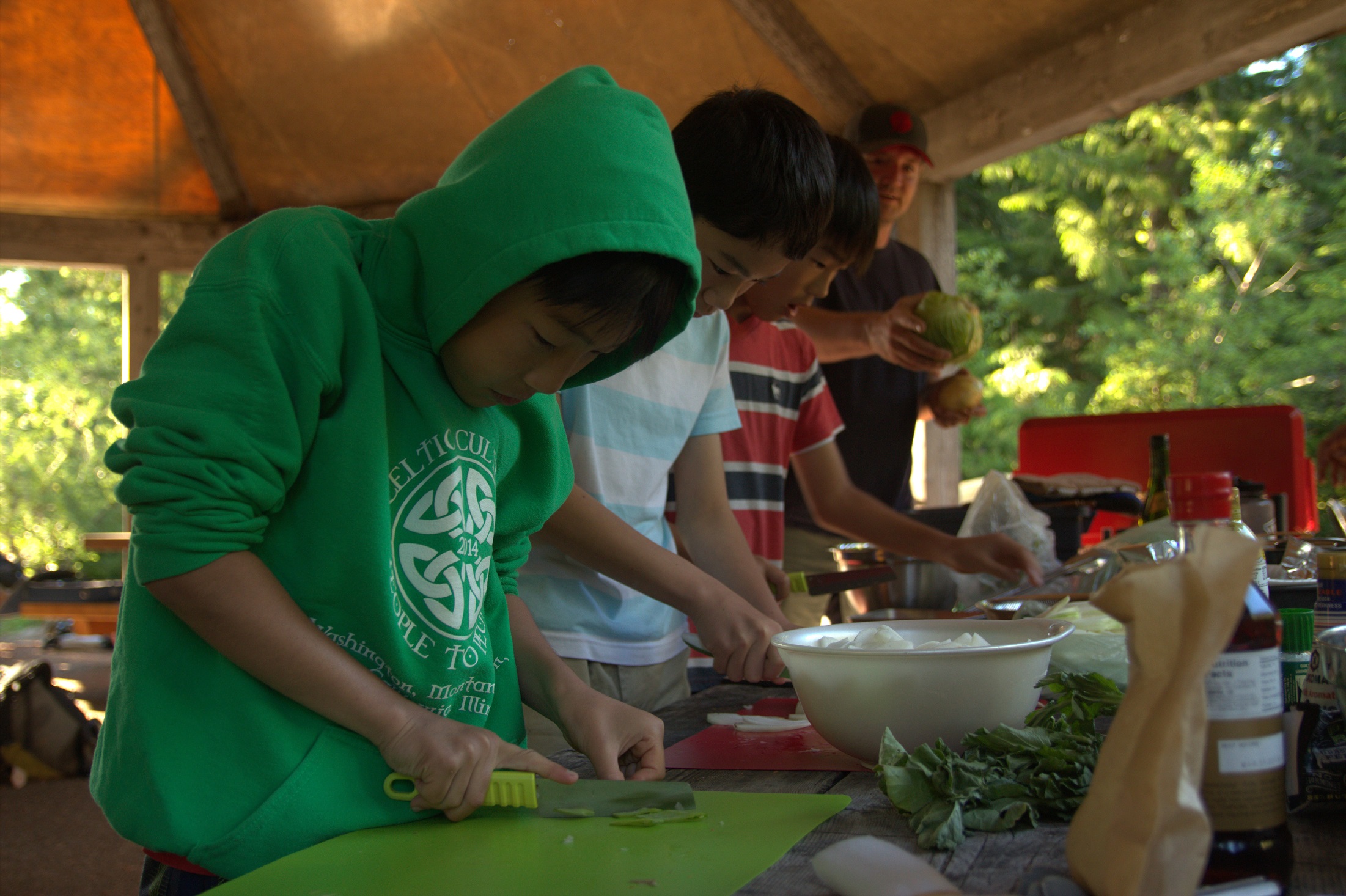
This is the stage when nature-based tasks really begin to get stunted in this day and age. Nature is less and less accessible these days, as it is shrinking and access is blocked more often.
The vast majority of people simply don’t value spending time in wild nature as a means in itself. It isn’t as widely discussed in child psychology and certainly not in the mainstream news as much as the dangers of letting children play freely. If we don’t see it as a vital part of our experience, we are missing out on telling our kids that this is an important piece of life. We need that childhood sense of wonder about the natural world.
Still, children will almost inevitably move on to the next stage of development, even if stunted.
This stage begins around ages 11-16ish. At this time, we are naturally unsure who we are. We are between a child and an adult and hyper-fixated on understanding the social dynamics of the world in which we are entrenched. Early Adolescents explore different ways of fitting into that world, discover new ways of being, what we’re good at, what we like, and what we aren’t great at.
Our physical skills, knowledge, conscious awareness, empathic capabilities, and bodies all shift rapidly from childhood through adolescence. We start to understand how others view us and incorporate that into our personalities. Intimate relationships become a mysterious and alluring venture as we develop feelings of attraction.
During previous stages of development, we don’t account for other peoples’ perspectives of us much at all. In this stage, other people’s perceptions of them come into play in massive ways. Those in this stage naturally explore different roles, altering themselves to present well to those around them. They don’t know who they are very well, and they’re acting ever differently to try and figure it out. That’s why those in this stage are considered “thespians” or actors.
We play these different roles and act in ways to show others how we want them to see us. We change ourselves in an effort to fit in with our peers, possible sexual partners, and those whose approval we seek or punishment we want to avoid. We come to understand who we are and who we aren’t more deeply through trial and error. We’re unsure of who we are and trying our best to find out.
At 13, that’s a natural part of our psychological development. We’re gaining an understanding of ourselves from the perspective of the world we live in. We’re flexible, and we’re giving it all our best go. At 30, 40, 50, or 60, it’s pathological.
Culturally, this underscores so many of our issues. We stay stuck in an extension of this stage often for life. We must complete the nature-based task of finding authenticity to get past it. In this stage, other people’s perceptions of them come into play in massive ways.
Most people alive now are mainly trying to get by, living through a life situation that brings them comfort and security but doesn’t satisfy their deeper sense of self. This keeps them a product of the culture, conditions, and messages around them. And they consume to feel better, to work towards what they think is “best.”
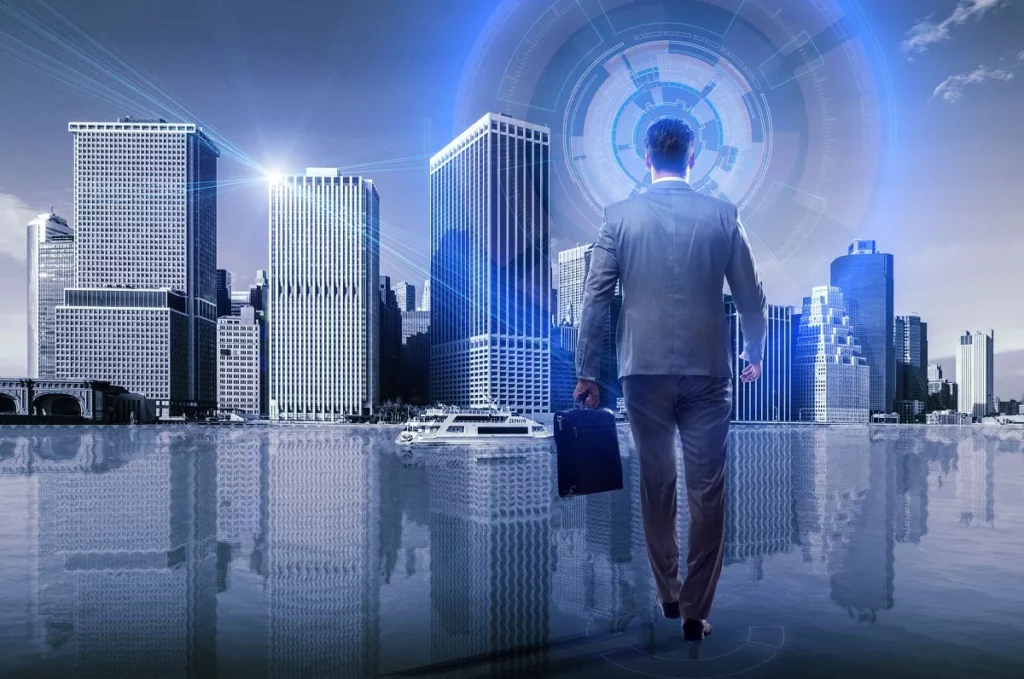
This stage is a great place to keep people from the standpoint of a culture built on harnessing people’s energy. Most of our jobs, businesses, and institutions function based on this self-centered perspective and need people willing to compromise their values for it.
Those who hold a strong sense of self-worth and know what fulfills them on a deeper level don’t much care about other people’s judgments and societal pressure. They can see through more shallow appeals to the ego and aren’t phased by cultural norms and expectations. Living according to your own, deeper values frees you to be the real you.
When you are your most authentic self, you can bring that more peaceful, loving, caring presence into the world in all you do. But those willing to go against cultural norms and figure out ways to do this are rare.
Instead, people compromise themselves and work for even the most harmful of organizations simply for the rewards it offers. The rewards are an external source of control, and consumption is another form of trying to bring in something external to make you feel whole. But it doesn’t actually fulfill them, and they feel it.
People will shame and numb parts of themselves to live like this. Larger culture has little use for your independence, autonomy, or peace. Domination-based cultures are built on a foundation of conflict, power, and control in pursuit of more of the same. It will continue this way as long as we compromise our values, our deeper humanity, for it. And it all comes down to our psychological development and coinciding values.
We have to move past this developmental stage, both individually and on a larger scale, to allow for the next phase of our evolution. It’s not just our evolution either, but that of every living creature on this planet. We’re the keystone species of this planet.
If we can live into our authenticity, we complete the third stage and move forward.
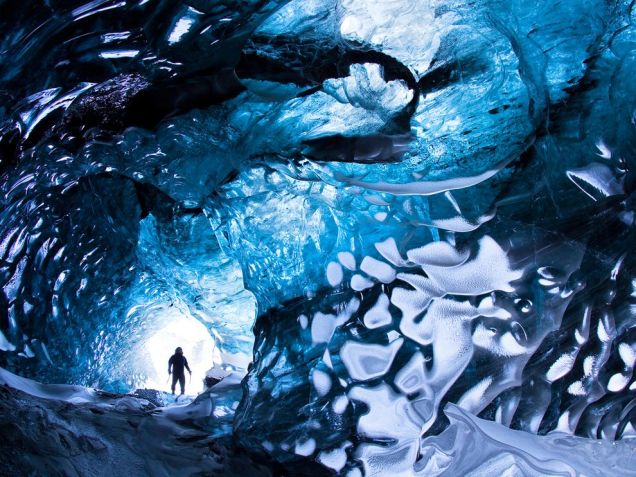
A funny thing happens at some point in adolescence. We go from wanting to be like everyone else and fitting in to wanting to be unique. It happens almost overnight. This is the shift to stage 4, late adolescence.
Those in stage 4 step away from what they know, the culture at large, and themselves in their previous stage and explore the greater mystery. This stage is all about coming into relationship with your deeper self, the larger world, finding your “place” within it and your gift to it and to your people.
Yes, that’s a lot. But this stage is just about finding it. After that, you’ll have the rest of your life to live into it, as long as you continue to let that guide you. This is just about the journey to get there.
This journey is both inward and outward. Everything is alive and popping. Your imagination speaks to you through visions and dreams. You, ideally, surround yourself with wild lands, the embodiment of universal intelligence. You become witness to the incredible forces of nature, both in the world around you and within yourself.
If one thing sets Ecopsychology and this stuff apart from traditional therapy and the mental health industry, it’s the concept of moments of vision or soul encounters.
These are moments when you let go of your ego so entirely that soul completely flows through you. Your entire perception of reality shifts, and you see everything differently. If this happens in a natural environment (and we’re much more susceptible to it there, which is no coincidence), you can more deeply understand yourself as part of a larger whole.
Maslow saw these as “Peak Experiences,” part of the path to self-actualization. But he didn’t offer much about how to find them. Carl Jung practically lived in this state for a year. But that’s pretty much as positive as it gets.
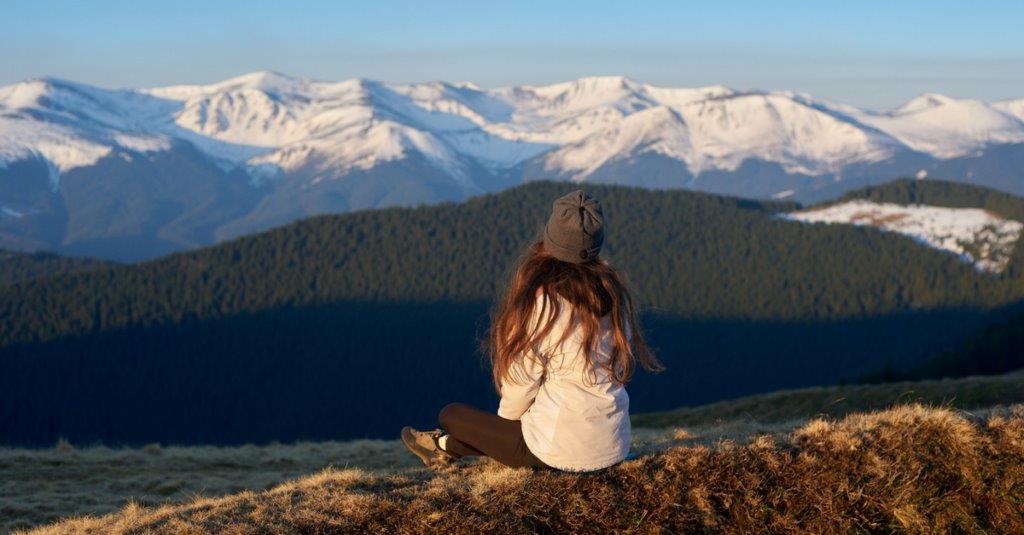
The overwhelming view of modern psychology, though, is that it’s overwhelmingly bad. Terrifying actually. They are described as a break from reality, psychotic episodes, delusions, or mania. Cannabis and mushrooms were outlawed because they take people to these places. A plant and fungi, while guns are used by the government every day. The real issue is that these moments are a threat to the order of society (said in my best 1950s voiceover), and the mental health industry is an institution of society more than it is of personal freedom and growth. At least, that’s the line it legally has to toe.
These moments can, of course, be fragile times. Your entire worldview is shifting. What can make them much worse is if the people around you are terrified, and they lock you up, and you lose your job and home. This certainly will make them traumatic experiences. So people hide them, feeling as though the world doesn’t get them.
The thing is, everyone has them; awareness and stories that we tell ourselves that never physically existed, but not only do we believe, they drive us. These moments are major stepping stones to recognizing your true self. Even better, if they happen in a nature-based setting, your limited, egoic, societally-based sense of self melts away, and you recognize yourself as part of something larger.
For better or worse, that won’t be your permanent state. But this is the shift in the foundation of your perception that can alter the course of your life.
It’s important to point out the transition between stage 4 and 5. If you look at the wheel as a full day, which is a cycle, it represents the halfway through is the sunset.
If you do it right, this, your true self, will be what you work towards in life. You find a deeper, larger sense of self and the part you play in the web of life, including within your own culture. You understand your shadow more and come into a different relationship with it (How’s that for a treatment outcome?) The foundation of your perception of everything, yourself included, becomes permanently altered. And you ground your life in deeper values.
Whether you had limited time in nature in your early childhood, during adolescence and identity development, or you missed out on other aspects of earlier stages, time in nature can always help your journey. It gives you the opportunity to catch up on all of the nature-based tasks of the previous stages.

This is the intention behind the “come as you are, do what feels right” approach. I created exactly what I would have liked to have had as I was going through my personal journey.
I’m hopeful that the people this reaches are either in late stage 3 or 4. This isn’t a judgment, nor is personal growth a competition. It’s being aware of, accepting, honoring, and even loving where you’re at. If you’re willing to do that, you’re already on the right track.
True adulthood and elderhood are all about bringing your gift that you find back into the world, creating a deeper human community, accepting and inclusive of life of all varieties, and transforming our presence into a sustainable species. That means altering our human-made culture with your life’s energy. Your energy will either support it or change it anyway, so why not go with the latter, assuming you know what that is?
Briefly:
Fifth Stage: Early Adulthood: Apprentice at the Wellspring
The fifth stage is about further understanding yourself and what continues speaking to you as you come back from your journey, while bringing your gift into your world. During this stage, a lot shifts. It can be difficult staying the course, with a lot of pressure to do otherwise. Due to this, it helps to have just as much time in nature to check in with yourself as it does in earlier stages, though with a bit more focus on reconnecting with the human community from this place.
Sixth Stage: Late Adulthood: Apprentice at the Wellspring
The sixth stage is about really bringing your work into the world and creating ripple effects from there. Your work becomes a source of well being, especially through others.
Seventh Stage: Master in the Grove of Elders
The seventh stage is about caring for others as a wise, kind human who has lived an incredible life. This should be where our politicians and leaders should be coming from.
Eighth Stage: Sage in the Mountain Cave
The last stage, you begin to gracefully fade back toward the cosmos, still in touch with the human community. That’s a lot different than the modern view of a stage of physical and psychological decline.
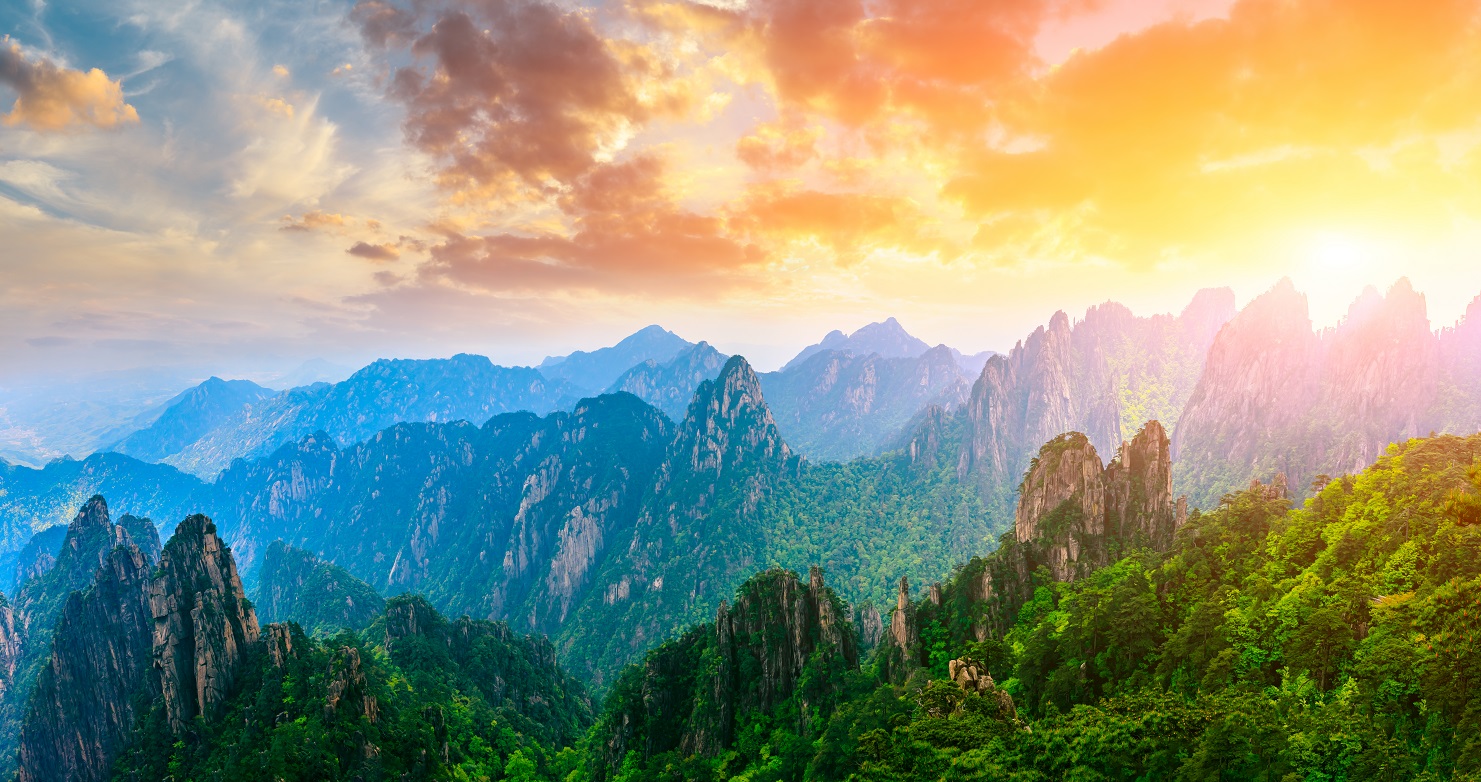
The path through adulthood is more unique and individual than the preceding stages of life. a personal transformation. When you do that successfully, and you stay true to it, you bring your new self back into the culture and change it rather than have it define you. Your work can change others, transform institutions and ecosystems, and others recognize and appreciate your work and your presence.
Very few people will have such an impact that they can change the entire world. But what you do spreads to others, and their work and energy spreads as well. This happens regardless, but the more people whose values are rooted in expressing their deeper self in all they do, in being in touch with the loving, caring, empathic beings we all are (developing that is part of the path of true adulthood) and giving their life to this, are the ones who will give us a chance.
There are a lot of ways to go from here. The best thing you can do is come out on a trip, especially the Cascade Lake Camp. Everyone is welcome to come out, find community, deepen your relationship with yourself and wild nature, and gain clarity on where you are at.
I’d also be happy to talk with you if there’s anything you’d like to talk through.
Lastly, leave a comment if you’d like to participate in the discussion or have questions.

Discover what a psilocybin retreat is, how it supports healing and mental health, and why Evolve Wild’s nature-based journeys offer a deeper transformation.

Discover what a psilocybin retreat is, how it supports healing and mental health, and why Evolve Wild’s nature-based journeys offer a deeper transformation.

Whether you chose to spend your time on a Nature Based Journey or one of the many retreats, you should know the difference. Here are 5.